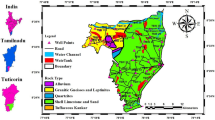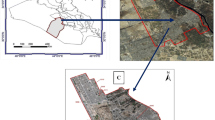Abstract
In this study, an attempt has been made to use the Canadian Council of Ministers of the Environment Water Quality Index (CCME WQI) model to classify groundwater suitability (n = 40) of Kadava river basin during pre and post monsoon season of 2012. The CCME WQI model computed for drinking and irrigation through guidelines of the Bureau of Indian Standards (BIS) and Food and Agricultural Organization (FAO). The pH, EC, TDS, TH, Calcium, Magnesium, Sodium, Potassium, Chloride, Fluoride, Sulfate and Nitrate variables were considered. The groundwater samples were classified into five categories from poor to excellent, ranges from 0 to 100. The result reveals that, the groundwater quality is poor to fair and majority of samples having marginal water quality for drinking. The groundwater quality is quite good for irrigation and it ranges from fair to good type with maximum samples fall in fair category. In the study area, the groundwater quality is considerably affected and found vulnerable in pre monsoon season due to intensive agriculture and anthropogenic activities. Spatial distribution maps of water quality index for pre and post monsoon season were prepared through GIS technique. In pre monsoon season, except Central part, many groundwater samples are found vulnerable and restricting their use for drinking. Three vulnerable hotspots are identified in North, NE and South region in post monsoon season. In pre monsoon season, Central, South and North part is affected; while, in post monsoon season, few patches in North, Central and Southern area are critical for irrigation use. In the study area, few aquifers are found to be problematic and thus limiting their use for drinking and irrigation. The CCME WQI is an effective tool to assess the groundwater quality and to communicate the health of water to multiple users. It gives precise results and water quality report in an easier way to the policy and decision makers. Finally, the study confirmed that the groundwater quality is influenced by agricultural activities and appropriate water management plan is essential to nurture precious groundwater resources in the study area.




Similar content being viewed by others
Explore related subjects
Discover the latest articles and news from researchers in related subjects, suggested using machine learning.References
American Public Health Association (APHA) (2005) Standard methods for the examination of water and wastewater. 21st ed. American Public Health Association, New York
Bhargava DS (1983) Use of a water quality index for river classification and zoning of the Ganga River. Environ Pollut B6:51–67
BIS (2012) Indian standards specification for drinking water. BIS: 10500
Bordalo AA, Teixeira R, Wiebe WJ (2006) A water quality index applied to an international shared river basin: the case of the Douro River. Environ Manage 38(6):910–920
Brown RM, Mclelland NI, Deininger RA, Tozer RG (1970) A water quality index—Do we dare? Water Sew Works 117(10):339–343
Canadian Council of Ministers of the Environment (CCME) (2001). Canadian Water Quality Index 1.0 Technical report and user’s manual. Canadian Environmental Quality Guidelines Water Quality Index Technical Subcommittee. Gatineau, QC, Canada
Central Groundwater Board (CGWB) (2014) http://cgwb.gov.in/district_profile/maharashtra/nashik.pdf
Chapman D (UNESCO, WHO, and UNEP) (1992) Water quality assessment. Chapman & Hall, London
Food and Agriculture Organization (FAO) (1985) Water Quality for Agriculture. Irrigation and Drainage Paper No. 29 Rev.1, Rome
Geological Survey of India (GSI) (2001) District resource Map. GSI, Nashik district
Glozier NE, Crosley RW, Mottle LW, Donald DB (2004). Water quality characteristics and trends for Banff and Jasper National Parks: 1973–2002. Saskatoon, SK, Canada: Environmental Conservation Branch, Ecological Sciences Division, Prairie and Northern Region, Environment Canada
Horton RK (1965) An index number system for rating water quality. J Water Pollution Control Fed 37(3):300–306
Khan F, Husain T, Lumb A (2003) Water quality evaluation and trend analysis in selected watersheds of the Atlantic Region of Canada. Environ Monit Assess 88:221–242
Khan AA, Paterson R, Khan H (2004) Modification and application of the Canadian Council of Ministers of the Environment water quality index (CCMEWQI) for the communication of drinking water quality data in Newfoundland and Labrador. Water Qual Res J Can 39:285–293
Khan AA, Tobin A, Paterson R, Khan H, Warren R (2005) Application of CCME procedures for deriving site-specific water quality guidelines for the CCME Water Quality Index. Water Qual Res J Can 40(4):448–456
Lumb A, Halliwell D, Sharma T (2006) Application of the CCME water quality index to monitor water quality: A case study of the Mackenzie River basin, Canada. Environ Monit Assess 113:411–429
Mukate SV, Panaskar DB, Wagh VM, Pawar RS (2015) Assessment of Groundwater Quality for Drinking and Irrigation Purpose: A Case Study of Chincholikati MIDC Area, Solapur (MS), India. SRTMUs J Sci4(1):58–69
Ott WR (1978) Water quality indices: a survey of indices used in the United States. Environmental Protection Agency, EPA—600\4-78-005.Washington, DC
Panaskar DB, Wagh VM, Muley AA, Mukate SV, Pawar RS, Aamalawar ML (2016) Evaluating groundwater suitability for the domestic, irrigation, and industrial purposes in Nanded Tehsil, Maharashtra, India, using GIS and statistics. Arabian J Geosci 9(13):615
Pesce SF, Wunderlin DA (2000) Use of water quality indices to verify the impact of Córdoba City (Argentina) on Suquía River. Water Res 34(11):2915–2926. doi:10.1016/S0043-1354(00)00036-1
Rocchini R, Swain LG (1995) The British Columbia Water Quality Index. Victoria, BC, Canada: Water Quality Branch, Environmental Protection Department, British Columbia Ministry of Environment, Land and Parks (13 pp)
Rosemond SD, Duro DC, Dubé M (2009) Comparative analysis of regional water quality in Canada using the Water Quality Index. Environ Monit Assess 156(1):223–240
Sánchez E, Colmenarejo MF, Vicente J, Rubio A, García MG, Travieso L, Borja R (2007) Use of the water quality index and dissolved oxygen deficit as simple indicators of watersheds pollution. Ecol Indic 7(2):315–328. doi:10.1016/j.ecolind.2006.02.005
Stallard RF, Edmond JM (1983) Geochemistry of the Amazon: 2. The influence of geology and weathering
Steinhart CE, Schierow LJ, Chesters G (1981) A review of water quality and related indices. Great Lakes Environmental Planning Study contribution No 38, Water Resources Centre, University of Wisconsin, Madison, Wisconsin, 53706, USA
Todd DK (1980) Groundwater hydrology 2ed. John Wiley, New York
Todd DK, Mays LW (2005) Groundwater hydrology, edition, vol 1625. Wiley, Hoboken
Tóth J (1999) Groundwater as a geologic agent: an overview of the causes, processes, and manifestations. Hydrogeol J 7(1):1–14
Vasant W, Dipak P, Aniket M, Ranjitsinh P, Shrikant M, Nitin D, Manesh A, Abhay V (2016) GIS and statistical approach to assess the groundwater quality of Nanded Tehsil (MS) India. In: Proceedings of first International conference on information and communication technology for intelligent systems: Vol. 1, Springer International Publishing, pp. 409–417
Wagh VM, Panaskar DB, Varade AM, Mukate SV, Gaikwad SK, Pawar RS, Muley AA, Aamalawar ML (2016) Major ion chemistry and quality assessment of the groundwater resources of Nanded tehsil, a part of southeast Deccan Volcanic Province, Maharashtra, India. Environ Earth Sci 75(21):1418
Acknowledgements
The authors are grateful to the Director, School of Earth Sciences, Swami Ramanand Teerth Marathwada University, Nanded, Maharashtra, India for providing necessary facilities to carry out the present research work.
Author information
Authors and Affiliations
Corresponding author
Rights and permissions
About this article
Cite this article
Wagh, V.M., Panaskar, D.B., Muley, A.A. et al. Groundwater suitability evaluation by CCME WQI model for Kadava River Basin, Nashik, Maharashtra, India. Model. Earth Syst. Environ. 3, 557–565 (2017). https://doi.org/10.1007/s40808-017-0316-x
Received:
Accepted:
Published:
Issue Date:
DOI: https://doi.org/10.1007/s40808-017-0316-x




